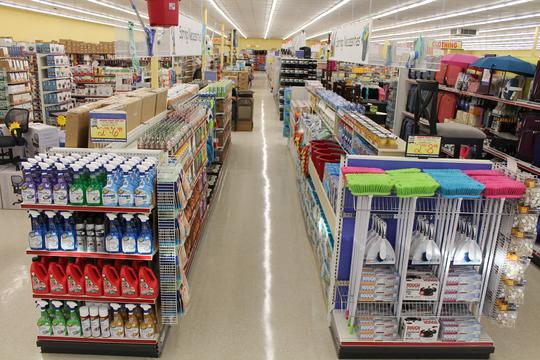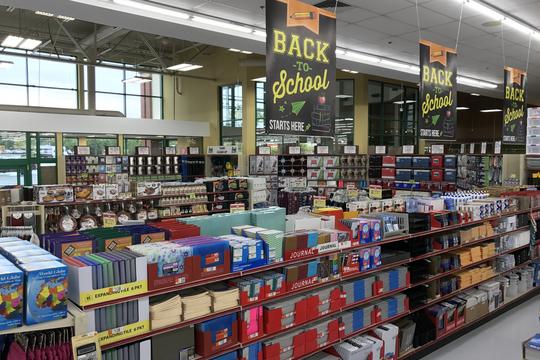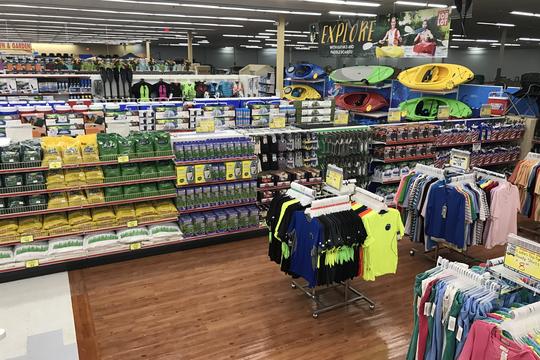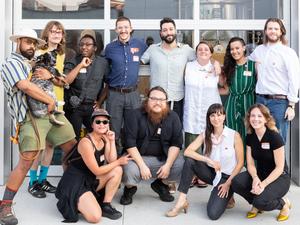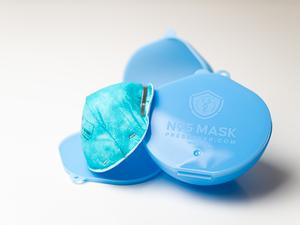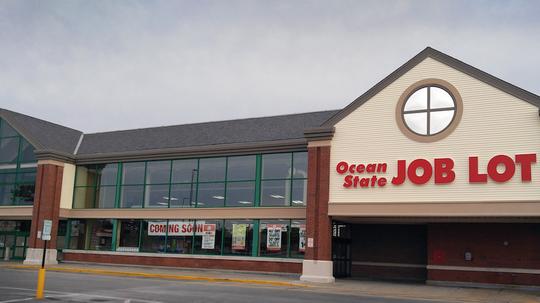
When Long Island natives Marc and Alan Perlman saw what was happening with closeout retailers in New York in the 1970s, they were immediately enamored.
Fresh out of college, the two brothers began collecting stuff from their parents garage and selling it at flea markets at Roosevelt Field. With Marc having attended college at the University of Rhode Island, he and Alan saw an opportunity to replicate the craze from New York in the Ocean State.
The two, along with Marc’s friend from URI, Roy Dubs, each put in $500 and would eventually open their first store in 1977 just off of Route 1 in North Kingstown, Rhode Island. They made $78 on their first day of business.
More than four decades later, that vision the Perlman's first had in their garage has turned into Ocean State Job Lot.
The company is not only a discount retailer that offers great prices on a range of different items, but also one of the great entrepreneurship stories in the state of Rhode Island and a retail chain that is now 133 stores strong, bringing in $685 million in annual sales.
“Their belief was that people work hard for their money and if you can help them stretch their dollars, then they will reward you with loyalty and continued business,” Paul Conforti, chief marketing officer at Ocean State, told Rhode Island Inno. “We will sell anything from can openers to kayaks as long as we can buy it at the right price and sell it at the right price.”
Ocean State’s business model involves purchasing inventory and merchandise opportunistically, with a willingness to sacrifice continuity for value.
“Retail is constantly changing. You have to adapt in order to change … Being successful means taking care of your customers, and providing a great value and experience.”
The company’s buyers, which to this day still includes its founders, scour the globe for the best deals.
That might mean purchasing merchandise from another retailer that made a big order and had leftovers, or from a company that went out of business and is trying to liquidate its assets. Ocean State also will look to purchase merchandise in bulk and with less packaging than, say, a standard supermarket.
For instance, said Conforti, a grocery store might sell disposable aluminum wrapped in plastic packages of three or four.
Ocean State, on the other hand, will sell the exact same item, but it might purchase the aluminum from the commercial division of a manufacturer in packs of 50 and put it on the shelves for people to buy in any amount.
“The grocery store is incurring much more for the presentation,” said Conforti. “We are looking for the opportunity to buy something for less than people are typically able to buy it for and share those savings with the consumer.”
The business model also means not limiting the company to certain inventory and being entrepreneurial. Kayaks are a great example.
Ocean State never sold kayaks until one day when the company encountered a great closeout deal for a few hundred kayaks at a sharp price.
Once the kayaks went on sale, they flew off the shelves, so Ocean State found some more chances to acquire kayaks. Before they knew it, the store was selling them on a regular basis along with life jackets, paddles, kayak roof racks for cars and carts to transport the kayaks from a car to the water.
“Kayaks became a gigantic category for us. It was something we did not sell; it was not on our radar and we would not have tried to sell it unless a closeout was presented it to us,” said Conforti. “The owners always say, ‘We can try anything once and if it doesn’t work we are not obligated to keep doing it. But if it does, it could be a big win for us and a big win for our customers.’”
Inventory isn’t the only thing that Ocean State looks at opportunistically; the company takes a similar approach to real estate.
Ocean State never has to be in any one market, according to Conforti, who said the company still does not have a store in Worcester even though it’s certainly a place that one would expect to be a good location for Ocean State.
The right real estate match just never came along.
Conforti said it’s about finding locations that fit within Ocean State’s financial modeling. The company has only built one of its 133 stores and will choose its locations based on a variety of factors including demographics, geography, sales forecast, perspective site and project expenses and the cost of advertising, among other factors.
Recently, Ocean State announced that it has purchased six former Toys “R” Us locations, and agreed to a long-term lease at a seventh location. Toys “R” Us filed for chapter 11 bankruptcy toward the end of last year and three of the locations that Ocean State is buying are the company’s first in Pennsylvania, its ninth state.
Conforti said that Ocean State is also planning to open three other new stores, making a total of at least 10 new stores in 2019, a pretty impressive feat in a world where retail has been upended by e-commerce.
"In an ever-changing retail environment where many retailers are struggling, Ocean State Job Lot has been able to adapt, enter new markets, re-open closed storefronts and create new job opportunities,” Marc said in a statement following the acquisition of the Toys “R” Us locations.
And Ocean State has no plans of slowing down.
Recently, the company completed a 500,000 square foot expansion of its warehouse in North Kingstown, making it the building with the largest footprint in Rhode Island with 1.25 million square feet. All of the new equipment in the warehouse such as the conveyor belts was acquired in typical Ocean State fashion: at a closeout.
The company purchased the equipment from Target at 10 cents on the dollar when Target closed its Canadian operations.
Ocean State has also built up a rewards program like other stores such as CVS and Walgreens, growing its Job Lot Insider Club program to 2.5 million members, which represents 60 percent of its transactions and 70 percent of sales, according to Conforti.
Now, the retail giant even has its eye on e-commerce.
Conforti said Ocean State rolled out a new website last April on the Oracle commerce platform. The website allows people to look up over 2,000 items on the website and check their availability in store.
While there is no time frame on when e-commerce might launch, Conforti said Ocean State might start by allowing people to purchase items online and then pick them up in stores.
“Retail is constantly changing,” he said. “You have to adapt in order to change … Being successful means taking care of your customers, and providing a great value and experience.”



